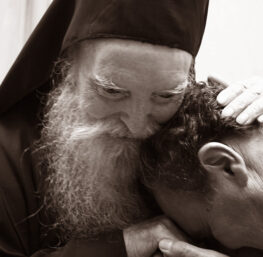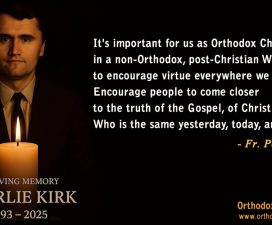First Things | by David B. Hart | 4/2010
I think I am very close to concluding that this whole “New Atheism” movement is only a passing fad—not the cultural watershed its purveyors imagine it to be, but simply one of those occasional and inexplicable marketing vogues that inevitably go the way of pet rocks, disco, prime-time soaps, and The Bridges of Madison County. This is not because I necessarily think the current “marketplace of ideas” particularly good at sorting out wise arguments from foolish. But the latest trend in à la mode godlessness, it seems to me, has by now proved itself to be so intellectually and morally trivial that it has to be classified as just a form of light entertainment, and popular culture always tires of its diversions sooner or later and moves on to other, equally ephemeral toys.
Take, for instance, the recently published 50 Voices of Disbelief: Why We Are Atheists. Simple probability, surely, would seem to dictate that a collection of essays by fifty fairly intelligent and zealous atheists would contain at least one logically compelling, deeply informed, morally profound, or conceptually arresting argument for not believing in God. Certainly that was my hope in picking it up. Instead, I came away from the whole drab assemblage of preachments and preenings feeling rather as if I had just left a large banquet at which I had been made to dine entirely on crushed ice and water vapor.
[…]
So it goes. In the end the book as a whole adds up to absolutely nothing—as, frankly, do all the books in this new genre—and I have to say I find this all somewhat depressing. For one thing, it seems obvious to me that the peculiar vapidity of New Atheist literature is simply a reflection of the more general vapidity of all public religious discourse these days, believing and unbelieving alike. In part, of course, this is because the modern media encourage only fragmentary, sloganeering, and emotive debates, but it is also because centuries of the incremental secularization of society have left us with a shared grammar that is perhaps no longer adequate to the kinds of claims that either reflective faith or reflective faithlessness makes.
The principal source of my melancholy, however, is my firm conviction that today’s most obstreperous infidels lack the courage, moral intelligence, and thoughtfulness of their forefathers in faithlessness. What I find chiefly offensive about them is not that they are skeptics or atheists; rather, it is that they are not skeptics at all and have purchased their atheism cheaply, with the sort of boorish arrogance that might make a man believe himself a great strategist because his tanks overwhelmed a town of unarmed peasants, or a great lover because he can afford the price of admission to a brothel. So long as one can choose one’s conquests in advance, taking always the paths of least resistance, one can always imagine oneself a Napoleon or a Casanova (and even better: the one without a Waterloo, the other without the clap).
But how long can any soul delight in victories of that sort? And how long should we waste our time with the sheer banality of the New Atheists—with, that is, their childishly Manichean view of history, their lack of any tragic sense, their indifference to the cultural contingency of moral “truths,” their wanton incuriosity, their vague babblings about “religion” in the abstract, and their absurd optimism regarding the future they long for?
I am not—honestly, I am not—simply being dismissive here. The utter inconsequentiality of contemporary atheism is a social and spiritual catastrophe. Something splendid and irreplaceable has taken leave of our culture—some great moral and intellectual capacity that once inspired the more heroic expressions of belief and unbelief alike. Skepticism and atheism are, at least in their highest manifestations, noble, precious, and even necessary traditions, and even the most fervent of believers should acknowledge that both are often inspired by a profound moral alarm at evil and suffering, at the corruption of religious institutions, at psychological terrorism, at injustices either prompted or abetted by religious doctrines, at arid dogmatisms and inane fideisms, and at worldly power wielded in the name of otherworldly goods. In the best kinds of unbelief, there is something of the moral grandeur of the prophets—a deep and admirable abhorrence of those vicious idolatries that enslave minds and justify our worst cruelties.
But a true skeptic is also someone who understands that an attitude of critical suspicion is quite different from the glib abandonment of one vision of absolute truth for another—say, fundamentalist Christianity for fundamentalist materialism or something vaguely and inaccurately called “humanism.” Hume, for instance, never traded one dogmatism for another, or one facile certitude for another. He understood how radical were the implications of the skepticism he recommended, and how they struck at the foundations not only of unthinking faith, but of proud rationality as well.
A truly profound atheist is someone who has taken the trouble to understand, in its most sophisticated forms, the belief he or she rejects, and to understand the consequences of that rejection. Among the New Atheists, there is no one of whom this can be said, and the movement as a whole has yet to produce a single book or essay that is anything more than an insipidly doctrinaire and appallingly ignorant diatribe.
If that seems a harsh judgment, I can only say that I have arrived at it honestly. In the course of writing a book published just this last year, I dutifully acquainted myself not only with all the recent New Atheist bestsellers, but also with a whole constellation of other texts in the same line, and I did so, I believe, without prejudice. No matter how patiently I read, though, and no matter how Herculean the efforts I made at sympathy, I simply could not find many intellectually serious arguments in their pages, and I came finally to believe that their authors were not much concerned to make any.
What I did take away from the experience was a fairly good sense of the real scope and ambition of the New Atheist project. I came to realize that the whole enterprise, when purged of its hugely preponderant alloy of sanctimonious bombast, is reducible to only a handful of arguments, most of which consist in simple category mistakes or the kind of historical oversimplifications that are either demonstrably false or irrelevantly true. And arguments of that sort are easily dismissed, if one is hardy enough to go on pointing out the obvious with sufficient indefatigability.
The only points at which the New Atheists seem to invite any serious intellectual engagement are those at which they try to demonstrate that all the traditional metaphysical arguments for the reality of God fail. At least, this should be their most powerful line of critique, and no doubt would be if any of them could demonstrate a respectable understanding of those traditional metaphysical arguments, as well as an ability to refute them. Curiously enough, however, not even the trained philosophers among them seem able to do this. And this is, as far as I can tell, as much a result of indolence as of philosophical ineptitude. The insouciance with which, for instance, Daniel Dennett tends to approach such matters is so torpid as to verge on the reptilian. He scarcely bothers even to get the traditional “theistic” arguments right, and the few ripostes he ventures are often the ones most easily discredited.
As a rule, the New Atheists’ concept of God is simply that of some very immense and powerful being among other beings, who serves as the first cause of all other things only in the sense that he is prior to and larger than all other causes. That is, the New Atheists are concerned with the sort of God believed in by seventeenth- and eighteenth-century Deists. Dawkins, for instance, even cites with approval the old village atheist’s cavil that omniscience and omnipotence are incompatible because a God who infallibly foresaw the future would be impotent to change it—as though Christians, Jews, Muslims, Hindus, Sikhs, and so forth understood God simply as some temporal being of interminable duration who knows things as we do, as external objects of cognition, mediated to him under the conditions of space and time.
[…]
To appreciate the true spirit of the New Atheism, however, and to take proper measure of its intellectual depth, one really has to turn to Christopher Hitchens. Admittedly, he is the most egregiously slapdash of the New Atheists, as well as (not coincidentally) the most entertaining, but I take this as proof that he is also the least self-deluding. His God Is Not Great shows no sign whatsoever that he ever intended anything other than a rollicking burlesque, without so much as a pretense of logical order or scholarly rigor. His sporadic forays into philosophical argument suggest not only that he has sailed into unfamiliar waters, but also that he is simply not very interested in any of it. His occasional observations on Hume and Kant make it obvious that he has not really read either very closely. He apparently believes that Nietzsche, in announcing the death of God, literally meant to suggest that the supreme being named God had somehow met his demise. The title of one of the chapters in God Is Not Great is “The Metaphysical Claims of Religion Are False,” but nowhere in that chapter does Hitchens actually say what those claims or their flaws are.
On matters of simple historical and textual fact, moreover, Hitchens’ book is so extraordinarily crowded with errors that one soon gives up counting them. Just to skim a few off the surface: He speaks of the ethos of Dietrich Bonhoeffer as “an admirable but nebulous humanism,” which is roughly on a par with saying that Gandhi was an apostle of the ruthless conquest and spoliation of weaker peoples. He conflates the histories of the first and fourth crusades. He repeats as fact the long discredited myth that Christians destroyed the works of Aristotle and Lucretius, or systematically burned the books of pagan antiquity, which is the very opposite of what did happen. He speaks of the traditional hostility of “religion” (whatever that may be) to medicine, despite the monastic origins of the modern hospital and the involvement of Christian missions in medical research and medical care from the fourth century to the present. He tells us that countless lives were lost in the early centuries of the Church over disputes regarding which gospels were legitimate (the actual number of lives lost is zero). He asserts that Myles Coverdale and John Wycliffe were burned alive at the stake, although both men died of natural causes. He knows that the last twelve verses of Mark 16 are a late addition to the text, but he imagines this means that the entire account of the Resurrection is as well. He informs us that it is well known that Augustine was fond of the myth of the Wandering Jew, though Augustine died eight centuries before the legend was invented. And so on and so on (and so on).
In the end, though, all of this might be tolerated if Hitchens’ book exhibited some rough semblance of a rational argument. After all, there really is a great deal to despise in the history of religion, even if Hitchens gets almost all the particular details extravagantly wrong. To be perfectly honest, however, I cannot tell what Hitchens’ central argument is. It is not even clear what he understands religion to be. For instance, he denounces female circumcision, commendably enough, but what—pray tell—has that got to do with religion? Clitoridectomy is a widespread cultural tradition of sub-Saharan Africa, but it belongs to no particular creed. Even more oddly, he takes indignant note of the plight of young Indian brides brutalized and occasionally murdered on account of insufficient dowries. We all, no doubt, share his horror, but what the hell is his point?
[…]
Read the article on the First Things website (new window will open).



